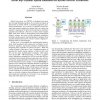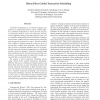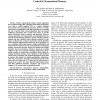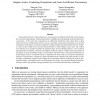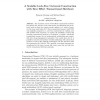148
click to vote
ISCA
2012
IEEE
13 years 4 months ago
2012
IEEE
Hybrid processors are HW/SW co-designed processors that leverage blocked-execution, the execution of regions of instructions as atomic blocks, to facilitate aggressive speculative...
154
click to vote
HPCA
2011
IEEE
14 years 5 months ago
2011
IEEE
Contention management is an important design component to a transactional memory system. Without effective contention management to ensure forward progress, a transactional memory...
123
click to vote
MICRO
2010
IEEE
14 years 8 months ago
2010
IEEE
Today's transactional memory systems implement the two-phase-locking (2PL) algorithm which aborts transactions every time a conflict happens. 2PL is a simple algorithm that pr...
133
click to vote
CACM
2011
14 years 9 months ago
2011
Software Transactional Memory (STM) promises to simplify concurrent programming without requiring specific hardware support. Yet, STM’s credibility lies on the extent to which ...
146
click to vote
IPPS
2010
IEEE
14 years 11 months ago
2010
IEEE
Affordable transparent clustering solutions to scale non-HPC applications on commodity clusters (such as Terracotta) are emerging for Java Virtual Machines (JVMs). Working in this ...
138
click to vote
IEEEPACT
2009
IEEE
14 years 11 months ago
2009
IEEE
Transactional memory is being advanced as an alternative to traditional lock-based synchronization for concurrent programming. Transactional memory simplifies the programming mode...
148
click to vote
HIPC
2009
Springer
14 years 11 months ago
2009
Springer
As the size of available datasets in various domains is growing rapidly, there is an increasing need for scaling data mining implementations. Coupled with the current trends in co...
161
click to vote
WDAG
2010
Springer
14 years 12 months ago
2010
Springer
The imminent arrival of best-effort transactional hardware has spurred new interest in the construction of nonblocking data structures, such as those that require atomic updates to...
122
click to vote
MICRO
2010
IEEE
14 years 12 months ago
2010
IEEE
While clusters of commodity servers and switches are the most popular form of large-scale parallel computers, many programs are not easily parallelized for execution upon them. In...
122
click to vote
IPPS
2010
IEEE
14 years 12 months ago
2010
IEEE
Abstract--Software transactional memory (STM) algorithms often rely on centralized components to achieve atomicity, isolation and consistency. In a distributed setting, centralized...
